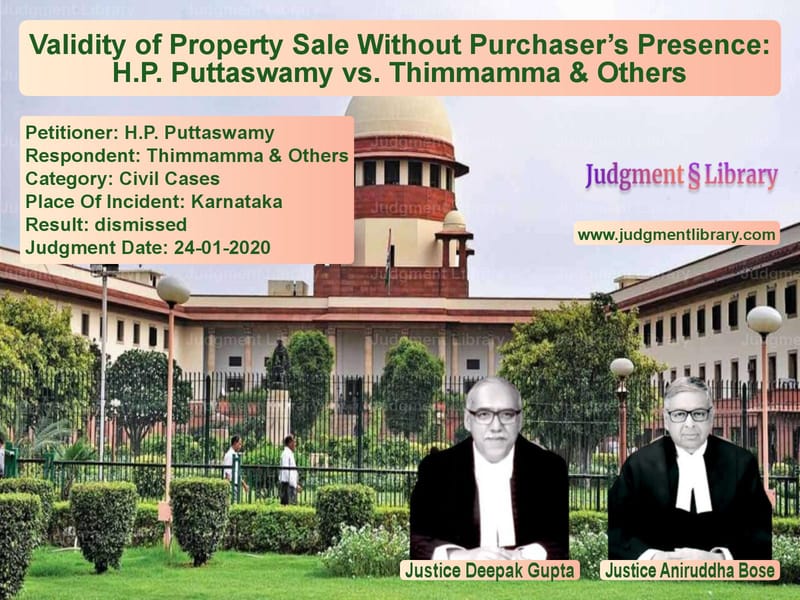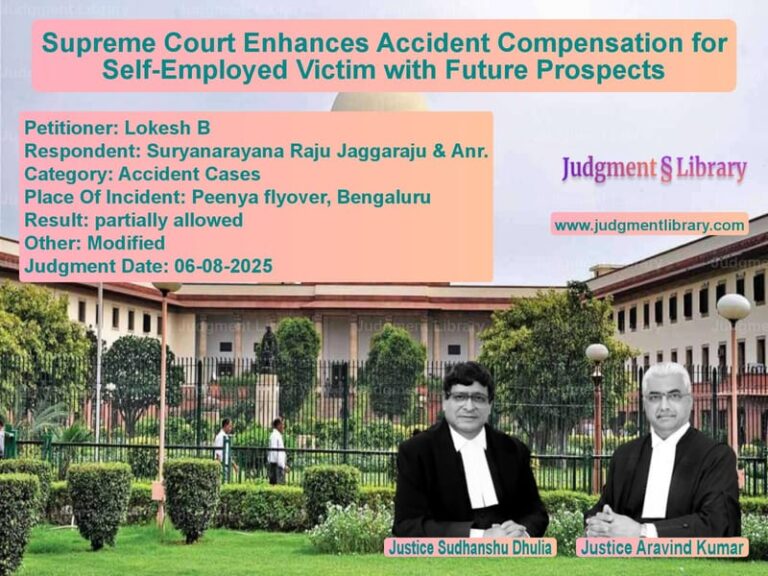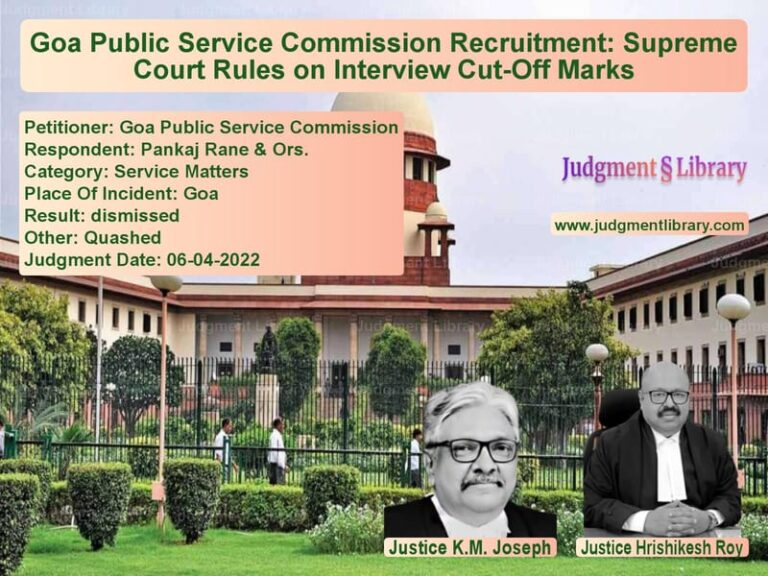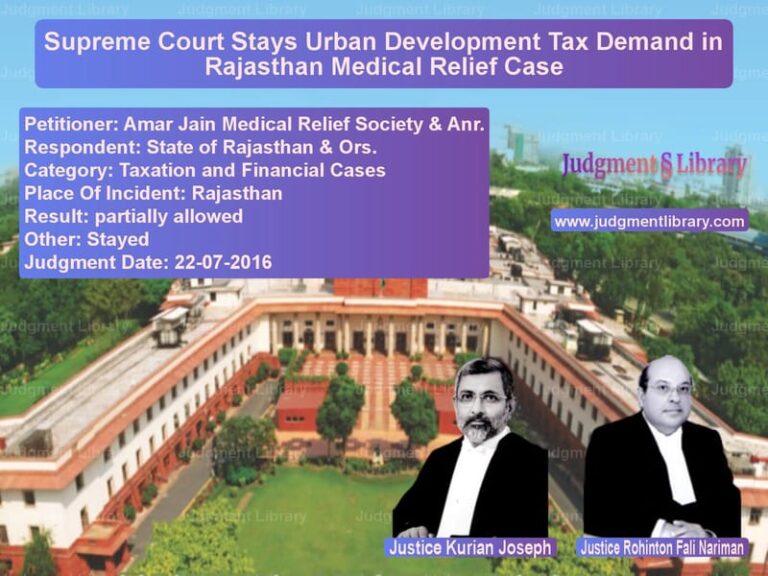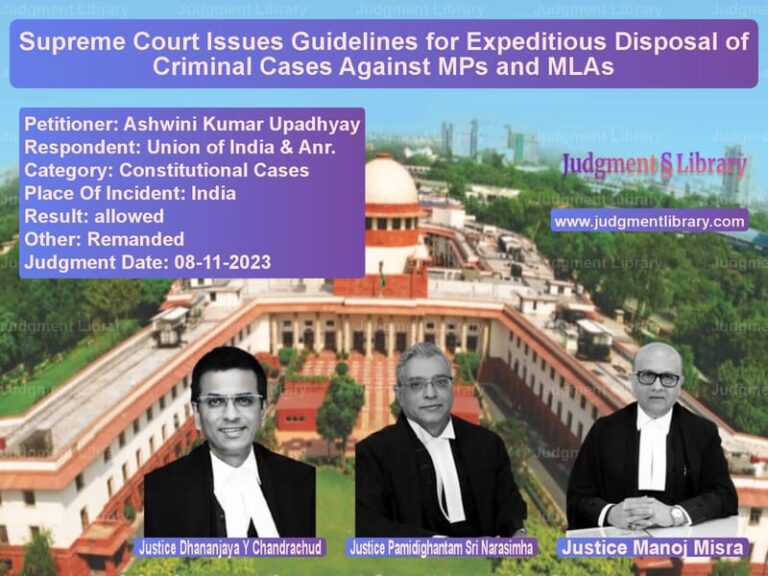Validity of Property Sale Without Purchaser’s Presence: H.P. Puttaswamy vs. Thimmamma & Others
The case of H.P. Puttaswamy vs. Thimmamma & Others revolves around a property dispute concerning the validity of a sale deed executed without the purchaser’s presence during registration. The key legal question before the Supreme Court was whether a property sale is legally binding if the purchaser is absent at the time of registration.
Background of the Case
The dispute pertains to a property measuring approximately 4500 square feet in Hittanahalli Koppalu village, Malavalli Taluk, Karnataka. The plaintiff, H.P. Puttaswamy, claimed to be the lawful owner and sought a declaration of ownership and permanent injunction against the defendants. The property had been initially allotted to one Gende Veeregowdana Nathegowda under a village shifting scheme. Later, it became the subject of multiple ownership claims.
The plaintiff asserted that he initially occupied the property as a tenant and subsequently purchased it from one Madegowda (son of the original allottee) through an agreement dated April 10, 1981, followed by a registered sale deed on May 28, 1981. However, another party, Manchegowda, also claimed ownership based on an earlier sale deed dated April 21, 1981. The primary point of contention was that Manchegowda, the alleged purchaser, was not physically present during the registration process.
Arguments of the Appellant (H.P. Puttaswamy)
The appellant advanced the following arguments:
- The sale deed in favor of Manchegowda was invalid as he was absent at the time of registration.
- The property was already in the possession of the plaintiff for nearly two decades before the dispute arose.
- The original allotment to Gende Veeregowdana Nathegowda was legally binding, and the subsequent sale to the plaintiff was lawful.
- The cancellation of the allotment in favor of Manchegowda was not properly documented.
Arguments of the Respondents (Thimmamma & Others)
The respondents countered the appellant’s claims with the following arguments:
- The plaintiff’s sale deed was executed after the property had already been sold to Manchegowda on April 21, 1981.
- As per the Karnataka Registration Rules and the Registration Act, 1908, a sale deed does not require the presence of the purchaser at the time of execution.
- The Trial Court erred in ruling against Manchegowda’s sale deed merely due to his absence during registration.
- The plaintiff’s claim of continuous possession was not supported by sufficient evidence.
Key Observations of the Supreme Court
The Supreme Court examined the case based on the following issues:
- Whether the absence of the purchaser at the time of registration invalidates a sale deed.
- Whether the sale deed in favor of Manchegowda was legally binding.
- Whether the plaintiff’s claim of possession and ownership was valid.
The Court made the following findings:
- The Registration Act, 1908, does not require the purchaser to be present for the execution of a valid sale deed.
- The sale deed in favor of Manchegowda was registered before the plaintiff’s sale deed, making it legally binding.
- The plaintiff failed to provide sufficient proof of long-term possession that could override the legally registered sale.
- The High Court had correctly interpreted the relevant provisions of law in ruling in favor of the respondents.
Verbatim Court Findings
The Supreme Court, while dismissing the appeal, stated:
“A combined reading of the above sections of the Registration Act and the Rules makes it clear that the presence of the purchaser is not required when the document is presented for registration before the Sub-Registrar.”
Additionally, the Court observed:
“Once the sale deed in favor of the defendant is held to be valid in law and the said sale deed being executed earlier in point of time, the question of the vendor retaining any interest in the suit property does not arise.”
Final Judgment
The Supreme Court upheld the High Court’s decision and ruled that:
- The sale deed executed in favor of Manchegowda was valid despite his absence at registration.
- The plaintiff’s claim of possession and ownership was not legally sustainable.
- The appeal was dismissed.
Final Verdict: Appeal dismissed.
Petitioner Name: H.P. Puttaswamy.Respondent Name: Thimmamma & Others.Judgment By: Justice Deepak Gupta, Justice Aniruddha Bose.Place Of Incident: Karnataka.Judgment Date: 24-01-2020.
Don’t miss out on the full details! Download the complete judgment in PDF format below and gain valuable insights instantly!
Download Judgment: H.P. Puttaswamy vs Thimmamma & Others Supreme Court of India Judgment Dated 24-01-2020.pdf
Direct Downlaod Judgment: Direct downlaod this Judgment
See all petitions in Property Disputes
See all petitions in Contract Disputes
See all petitions in Landlord-Tenant Disputes
See all petitions in Judgment by Deepak Gupta
See all petitions in Judgment by Aniruddha Bose
See all petitions in dismissed
See all petitions in supreme court of India judgments January 2020
See all petitions in 2020 judgments
See all posts in Civil Cases Category
See all allowed petitions in Civil Cases Category
See all Dismissed petitions in Civil Cases Category
See all partially allowed petitions in Civil Cases Category

